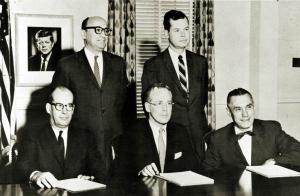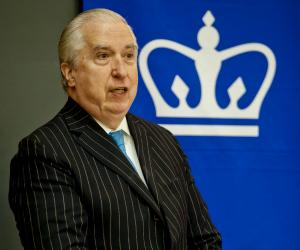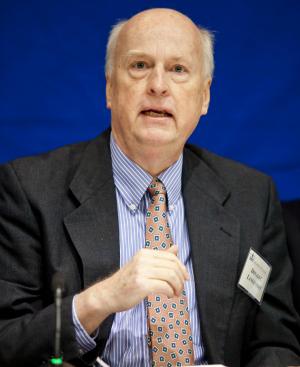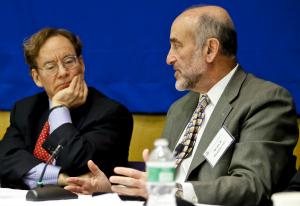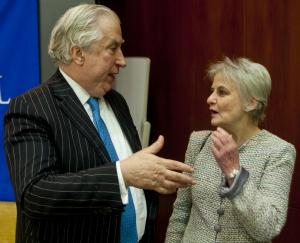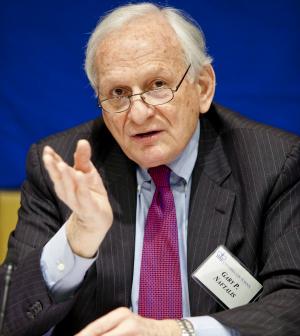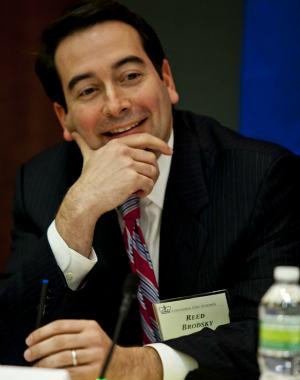Past, Present, and Future of Insider Trading Law Examined at Columbia Law School Conference
New York, November 28, 2012—Judges, practitioners, and academics met on Nov. 16 at Columbia Law School to discuss insider trading law and enforcement and to commemorate the anniversary of an important U.S. Securities and Exchange Commission (SEC) decision.
| (standing) Manuel F. Cohen and Jack M. Whitney III; (seated) Byron D. Woodside, William L. Cary and J. Allen Frear, Jr. Photo courtesy of www.sechistorical.org |
The experts gathered at a daylong conference, “The Past, Present, and Future of Insider Trading: A 50th Anniversary Re-examination of Cady, Roberts and the Revolution it Began” chaired by John C. Coffee Jr., the Adolf A. Berle Professor of Law.
“If the rules keep relaxing like this, we may find we’re playing tennis with the net down,” he said.
The conference was timed to coincide roughly with the 50th anniversary of In re: Cady, Roberts & Co., the 1961 SEC administrative opinion that created a mainstay of insider trading law: the requirement that a person with non-public information about a company either disclose it prior to selling or buying stock in that company or abstain from such transactions.
| Professor John C. Coffee Jr. |
Jeffrey N. Gordon, the Richard Paul Richman Professor of Law and Co-Director of the Richard Paul Richman Center for Business, Law and Public Policy at Columbia Law School, moderated the first panel discussion, “Where Is The Line? Shifting Standards in the U.S. and Abroad.”
| Donald C. Langevoort |
“The question we’re still asking today is: How much of that Cary, Powell [compromise]still dominates?” he said.
Conference participants also examined a decision handed down Nov. 14 by Rakoff. His ruling in U.S. v. Whitman considers whether state or federal law defines the scope of an employee’s duty to keep material non-public information confidential, as well as the scope of criminal liability in insider trading scenarios.
Later, Rakoff, who teaches a Law School seminar with Coffee titled Black Letter Law/White Collar Crime, spoke on a panel called “A Second View” and weighed in on an issue that generated substantial discussion throughout the conference: Are insider trading cases impossible for defendants to win? Rakoff noted that insider trading law continues to evolve, which may create opportunities for defendants to challenge their convictions on appeal.
“There have probably been a higher percentage of reversals because the law is still unsettled,” he said. “It’s still developing; it’s kind of an odd ball.”
| (left) Professor Jeffrey N. Gordon and Mark F. Pomerantz |
“The common perception is that juries always convict,” he said, adding that tough sentences have become increasingly common. “You have seen sentences of seven years, eight years, 12 years. That, I suppose, leads to the question: Does the ratcheting up of sentences over time lead to deterrence?”
Harvey J. Goldschmid ’65, Dwight Professor of Law at Columbia Law School and former general counsel and commissioner at the SEC, moderated another panel discussion, “Cady, Roberts, Bill Cary and the Road to Today: Scandals Now and Then.”
Panelist Stanley Sporkin, a former U.S. district judge and former director of the SEC Division of Enforcement, argued that the SEC grew “lethargic” in its pursuit of insider trading cases after Cary left as chairman. Goldschmid countered that the SEC has an inadequate budget to conduct proper enforcement.
“You cannot starve an agency and expect it to be efficient,” he said.
Sporkin also participated in a later panel with U.S District Judge Cote; Richard H. Walker, general counsel of Deutsche Bank; and Daniel Hawke, the regional administrator for the Philadelphia office of the SEC. The discussion, titled “The SEC’s Perspective,” was moderated by Coffee, who focused on the impact of SEC proceedings on parallel criminal cases and judicial oversight of SEC settlements.
Cote declined to speak about pending cases or specific judges. But she said, “by-and-large, there is very little judicial scrutiny” when judges first learn of a case with the filing of an agreed-upon settlement.
| (left) Professor John C. Coffee Jr. and Judge Denise L. Cote '75 |
“One of the wonderful things about Article III is [it allows judges to] have our own perspective,” Cote said. “There are many ways to be an Article III judge. It’s what you think you must do to fulfill your duty under the law.”
The conference also featured lunchtime presentations from Pulitzer Prize-winning journalist James B. Stewart, author of “Den of Thieves,” and University of Rochester President Joel Seligman, author of Securities Regulation, a leading treatise in the field. In the afternoon, judges and lawyers from two of the highest-profile insider trading cases in history participated in two panels:
- “A View from the Front Lines,” featured a discussion of enforcement trends by participants in the criminal trial of Raj Rajaratnam, the hedge fund billionaire who was convicted of insider trading and sentenced to 11 years in prison in 2011. Panelists included former Judge Holwell; former Assistant U.S. Attorney Jonathan R. Streeter, of Dechert; and Rajaratnam’s attorney John M. Dowd, of Akin, Gump, Strauss, Hauer & Feld. Columbia Law School professor Daniel C. Richman moderated the discussion.
| Gary P. Naftalis '67 LL.M |
- “A Second View,” featured a discussion by participants in the criminal trial of Rajat Gupta, the former Goldman Sachs director who was convicted of insider trading and sentenced to two years in prison last month. Panelists were Judge Rakoff; Assistant U.S. Attorney Reed Brodsky; and Gupta’s lead defense attorney, Naftalis. Coffee moderated the panel.
Brodsky said he suspects prosecutors around the country will begin to rely on wiretaps for future investigations into insider trading.
“How often can you show the jury crimes in action?” Brodsky asked. “There is no better evidence. It’s very difficult for the defense to overcome that type of evidence.”
| Reed Brodsky |
Rajaratnam’s lawyer, Dowd, said there are many misimpressions about the wiretap evidence that was used to convict his client.
“It’s not the smoking gun you think about,” said Dowd. “It was, and still is a circumstantial case.”
Former Judge Holwell, who presided over the case, said it is difficult to overstate how damaging wiretap evidence can be to a jury.
“Playing a recording in front of a jury of you calling your mother to ask what you’re going to have for Sunday dinner sounds criminal,” he said.
